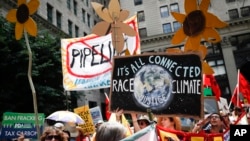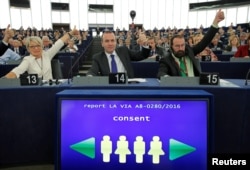President Barack Obama has called climate change the greatest long-term threat facing the world, but it is an issue that has largely disappeared from the 2016 presidential contest between Democrat Hillary Clinton and Republican Donald Trump to pick Obama's successor.
During three contentious 90-minute debates between Clinton and Trump, the moderators did not ask them a single question about climate change, and the candidates mentioned it only in passing, along with the related issue of energy production. Political surveys show climate change and the environment are far down the list of concerns for U.S. voters, well behind such issues as the economy, terrorism, foreign policy and health care.
But Clinton and Trump hold diametrically opposed views on climate change. Their positions would leave the United States, if Clinton is elected November 8, in line with the rest of the world in adoption of the Paris climate change pact to curb greenhouse-gas emissions or, if Trump is elected, possibly isolated on environmental issues.
Pact in effect next week
Clinton, a former U.S. secretary of state looking to become the country's first female president, supports the Paris compact. It takes effect late next week, after a collection of countries that are some of the world's biggest polluters signaled support for it earlier this month.
When an undecided voter raised the issue of energy production at the second debate, Clinton responded, "I have a comprehensive energy policy, but it really does include fighting climate change, because I think that is a serious problem. And I support moving toward more clean, renewable energy as quickly as we can, because I think we can be the 21st-century clean-energy superpower and create millions of new jobs and businesses."
Trump, a real estate tycoon running for elected office for the first time, took a different tack, without mentioning climate change.
"I will bring our energy companies back. ... They'll pay off our national debt," he declared. "They'll pay off our tremendous budget deficits, which are tremendous. But we are putting our energy companies out of business. We have to bring back our workers."
A concern for younger voters
One wealthy Clinton supporter, hedge fund manager and environmentalist Tom Steyer, founded NextGen Climate, and that group says he funded the bulk of a $50 million effort to mobilize more than a million younger voters in key election states. NextGen says Clinton recognizes climate change as an important issue, and that it is a key concern for many younger voters.
"The choice is clear," according to NextGen. "Clinton will continue President Obama's climate leadership and create good-paying clean-energy jobs, while Trump would move the United States backward and endanger our climate, economy and national security."
Trump on several occasions has rejected climate change as a major concern, telling one interviewer earlier this year, "Climate change is just a very, very expensive form of tax. A lot of people are making a lot of money [from it]. I know much about climate change.
"I often joke that this is done for the benefit of China — obviously, I joke — but this is done for the benefit of China," he added, to force costly environmental improvements on the U.S. economy, the world's largest.
Trump's program, if elected
Trump expanded on his energy views last weekend as he laid out an array of policy positions and actions he asserted would take place during his first 100 days in office if elected.
Among other things, Trump said, he would "lift the restrictions on the production of $50 trillion worth of job-producing American energy reserves. And we will put our miners back to work."
Trump said he would remove "roadblocks like you have never ever seen" to construction of energy-related projects, such as the Keystone Pipeline, a project vetoed by Obama, which would carry oil from Canada through the central U.S. to refineries along the Gulf of Mexico.
He also declared that the U.S. would withdraw with the Paris pact, "cancel billions in payments to the United Nations' climate change programs and use them to fix America's water and environmental infrastructure. We're going to fix our own environment."
Whose interests come first?
U.S. Representative Kevin Cramer, a North Dakota Republican who has been Trump's key energy adviser, told VOA the Republican presidential candidate could attempt to withdraw from the Paris agreement by calling for Senate ratification of the pact while anticipating it would not be approved.
Cramer, who has debated a Clinton energy adviser a half dozen times during the campaign, said the issue of support for the Paris agreement raises a key question for the United States: "Are we going to acquiesce American interests to global interests forever? At the heart of this, I think, is probably the best example of what [Trump] means when he talks about 'America first.'"
Cramer said he thought Trump "has the high ground" with voters on energy issues "because of jobs" that could potentially be lost as the U.S. moves toward stricter environmental controls.
The American Petroleum Institute said its survey of American voters showed that they support more energy production in the U.S. and that such production could boost the country's labor market and cut energy costs for consumers.
But Cramer acknowledged that the issues of climate change, energy and environmental concerns were "not even in the top 20 issues" voters are worried about, and that "politicians cover what the public is most interested in."







